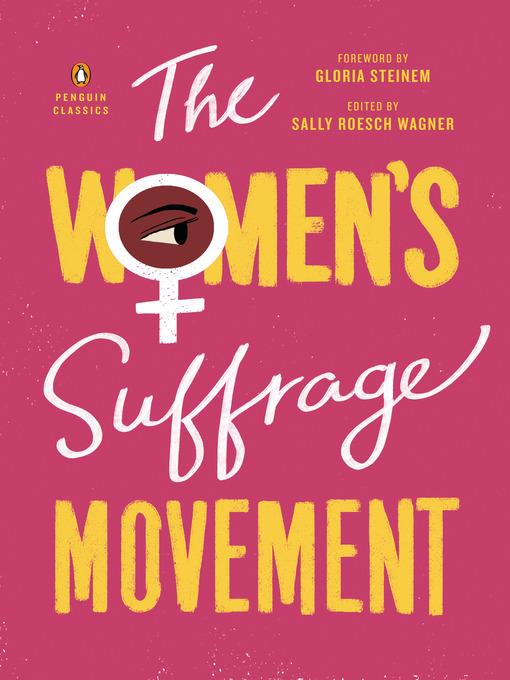
The Women's Suffrage Movement
- اطلاعات
- نقد و بررسی
- دیدگاه کاربران
نقد و بررسی

January 15, 2019
Primary documents provide insight into the struggles within the women's suffrage movement in the United States up until the ratification of the 19th Amendment in 1920.Historian Wagner (Sisters in Spirit: Haudenosaunee (Iroquois) Influences on Early American Feminists, 2001, etc.) opens with a chapter about the key role of women in the Iroquois Confederacy in upstate New York before the United States became a nation. "Unlike almost every other historian," writes Gloria Steinem in the foreword, "[Wagner] doesn't treat this country as if it began with Columbus." Wagner then moves on to discuss the development of the women's suffrage movement in the decades before the first national women's rights convention in 1850. Covering the years from the 1850s to 1920, the editor devotes a chapter to the events of each decade. An introduction to each chapter provides a generous amount of historical context, which brings the implications of the primary documents--some of which are included in full and others of which are excerpted--into focus. These documents include speeches at women's rights conventions and to the general public, and they reveal the striking tensions between various factions of the movement as well as their commonalities. Wagner broadens her subject to include not just discussions of women's suffrage, but also birth control, "free love," divorce, and women's economic and social rights. The structure of the volume makes clear the protracted nature of the struggle and how many now-little-known individuals were involved in it in addition to famous figures like Elizabeth Cady Stanton and Susan B. Anthony. Wagner never hesitates to point out the flaws in her subjects and the movement, notable among which is the fact that the "suffragists," as they called themselves, were often casually or even intentionally racist, arguing that educated white women were more deserving of political power than ex-slaves.Abundantly useful for aspiring scholars, while those with a casual interest in the subject will be struck by its surprising complexity.
COPYRIGHT(2019) Kirkus Reviews, ALL RIGHTS RESERVED.

Starred review from March 1, 2019
Roesch Wagner (Sisters in Spirit) gathers two centuries of historical work about the U.S. women's suffrage movement in this dense intersectional anthology. With a foreword by Gloria Steinem, this collection contains not only works by well-known suffragists such as Susan B. Anthony and Elizabeth Cady Stanton but prose by suffragist Ida B. Wells and other women of color, whose contributions to securing women's right to vote have been largely ignored because of their race. Wagner exposes the problematic history of racism within the movement and reveals connections between women's suffrage and the civil rights movement. The anthology traces the fight for women's suffrage from its start through early state victories until the suffrage amendment was finally ratified in 1920. Each chapter outlines and explains the accompanying historical texts. Pro-suffrage voices are not the only ones included; Wagner also highlights work by women and men opposed to the movement, truly rounding out the diverse voices contributing to this volume. VERDICT An essential compilation for libraries wishing to add to their women's studies and history collections.--Venessa Hughes, Denver
Copyright 2019 Library Journal, LLC Used with permission.

May 20, 2019
Women’s studies scholar Wagner (She Who Holds the Sky: Matilda Joslyn Gage) assembles a hefty and somewhat idiosyncratic compendium of primary source documents that charts the long road to the passage of the 19th Amendment, the 100th anniversary of which will arrive in 2020. Wagner explains in the volume’s introduction that it’s impossible to create a definitive collection from such a large movement; instead, as editor, she functions as a “tour guide pointing out some high spots along the way.” Most of the sources come from white women, especially movement leaders such as Susan B. Anthony, Matilda Joslyn Gage, and Elizabeth Cady Stanton. The selections are sometimes odd: part one, “Women Voted Before the United States was Formed,” contains no documents from the colonial period nor any generated by Native American women, and the last chapter, on the final suffrage victory, contains only one source describing the amendment’s ratification in Tennessee. Selections in the intervening sections better illuminate the struggle for suffrage, including Stanton’s foundational “Declaration of Sentiments,” Anthony’s call for universal suffrage, and Mary Church Terrell’s examination of the 15th Amendment. Despite its length, this is—just as Wagner explains—not a comprehensive history of the movement, but the documents contained within are valuable and illuminating.

February 15, 2019
Historian Wagner's brimming historical anthology presents a rich and arresting array of letters, speeches, book excerpts, press coverage, congressional reports, petitions, and more within a vivid and expertly composed social context, creating a spectacularly new, inclusive, and enlightening approach to the long, complicated, and contentious battle over myriad women's rights issues. Familiar figures are viewed from fresh perspectives, while the reclamation of overlooked and diverse suffragists exponentially expands our understanding of just how many-faceted and daunting the pursuit of gender equality has been and continues to be. The most salient element is recognition of the deep influence the gender-equal Iroquois nations had on suffragists, beginning with Matilda Joslyn Gage. Wagner also offers an in-depth look at the struggle to fight simultaneously for both women's rights and the abolition of slavery, and she confirms the role of African American suffragists, including Ida B. Wells. With a penetrating foreword by Gloria Steinem and Wagner's astute and fluent blend of fact and analysis, this is a superbly informative, debate-igniting, and timely resource as we look ahead to 2020 and the centennial of the Nineteenth Amendment.(Reprinted with permission of Booklist, copyright 2019, American Library Association.)




دیدگاه کاربران